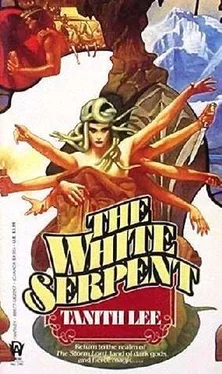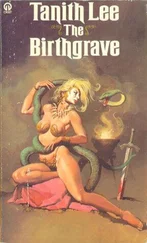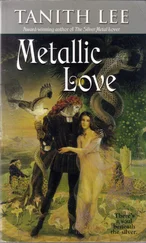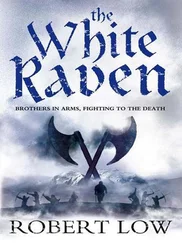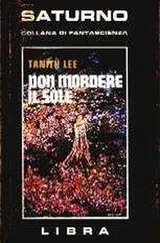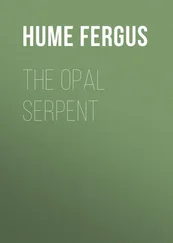The allergy of all that place, directed toward him like an instinctive music—this he could not fail to sense. She had said he must be gone before the new day. He had beheld them in their sanctum, and he had been allowed to judge the rite of reincarnation. And he was Amrek, and All-Vis.
But their antipathy was nothing in the peace of that evening. Beside her lawless and boundless beauty, nothing. The Star exalted in their celibate heaven.
As they walked, they spoke occasionally of Alisaar, of Saardsinmey, as if still it throve, sparkling with torches, and the races in the stadium due to begin. They laughed together once, thrice. The old stigmas had been sloughed, with the meanings of time and sentience.
In the oval hall of Aztira’s mansion, slaves had laid out a princely supper. The plates were silver chased in gold, with a design of sea-monsters—assuredly a gift from Sh’alis.
The wine was red: From Vardath.
Their conversation, which had become untrammeled, melted into the pauses of reflection, and of desire.
Her bedchamber, reached by a little low stair, warmed by a dozen tapers, had no windows, was enclosed as the womb of a shell.
Her nakedness, when he encountered it, the whiteness of her, like ice or marble, had, too, its inner fires, which he had forgotten. They took each other like leopards, famished, the commerce of a minute. And then again, the earth revolving and flung away.
It was the house behind the lacemakers. He heard the far shamble of the traffic on Five Mile Street.
Or it was Moih, and at his prayer the statue had become flesh.
“Rehger, forgive my use of you.”
“We seemed evenly matched.”
“That was not the use I meant.”
“I will forgive you anything, Aztira Am Ashnesee. You will outlive me, anyway. What does it matter?”
“Once you leave me here,” she said, “I shall become again a ghost, to you.”
As they lay on the pillows, through the final hour of darkness, she had begun to plait her hair. When he moved from her arms, he found it all in fetters round him. He lifted three or four of the plaits, shook them, and let loose the showering hair.
“You smell always of blossom and clear water.”
“But you will forget me, nevertheless.”
He made to begin loosening another of the plaits. She stopped this.
“In Iscah,” she said.
“In Iscah, what?”
“The sign of a married wife.”
He stared then deeply into her eyes, frowning, curious.
“What mystery is this?”
“Never mind it,” she said.
He put his mouth to her breasts, their pale and velvety buds, but lust was done with, hers and his. She had called him by his Alisaarian name, but he might forget that also, when he left her. He knew as much, indifferently.
“The dawn has begun,” she said softly, in a while. “A man will be standing in the garden, under the tree where the doves gather—do you recall? He led you into the city, and will lead you out of it. A hidden river runs away through caverns toward the coast. Where it breaks from the ground, there will be a boat, provisioned and ready. But then there is the wide western sea. Oh, Rehger,” she said.
“Zastis is good sailing weather,” he said.
She did not weep. Her eyes, as the Lowlanders said, were formed of tears.
They made love an ultimate time, swimming and slow, drowning, and cast ashore apart.
Transparent sunrise flooded the bedchamber when its door was opened.
He went between the bars of light, each falling behind him like a dreamer’s sword.
Not till he had traveled the corridor’s length, did he hear her say, “Don’t turn. There’s an ancient rhyme which warns against it. Forget me and prosper. I think you will know me still, when next we meet.”
He raised the curtain at the corridor’s end, and going on, let it fall again, between them.
The white man met Rehger Am Ly Dis under the tree of doves. They went together, not a phrase exchanged, to the lower tract of the garden, by the fountain there, and into the tunnels beneath Ashnesee.
So then the Vis wanderer saw Aarl-Hell, out of the legends of his own people. It was glimpsed, inadvertently almost, at a turning here, in a passage there—Laval fires burned in it and toiling figures lurched hither and thither spawning nightmare shadows. The slaves of the Chosen Race were busy. They oiled the clockwork of paradise above and could not afford to idle.
The undercity was an ant hill.
Rehger passed through it unchallenged on the heels of his guide, and came at long last into a luminous cave. Flat and thin, the river wormed along its rocky channel.
The Amanackire observed Rehger’s progress down the bank for less than a minute before retracing his steps into the warren of hell.
Alone, about an hour after, Rehger encountered a group of slaves on the river rocks. But they did not appear to see him, though he went by within three feet of them. They were fishing in the steely water.
And later again, when daylight had started to be ahead of him, he saw another detachment of slaves, squatting on the bank. They were actually laboring at nothing, perhaps resting. (Their faces were mindless yet controlled.) They might have been the very ones who had put ready the boat—and stacked in it the store of food and barrels of water and wine—that presently he came on.
It perched in the shallows, and beyond, the river yawned wide and the cave frayed into air and sky and leaning granite. And on the clifftop, the black thatch of the jungle-forest flourished like giant weeds.
Rehger pushed the boat into the main course of the river, brown and lazy water veiled by insects and heat. He rowed, and in the forests the sun beat and birds squalled.
The city had disappeared, and soon an angle of the river-wall closed away the exit from the caverns.
The day and the river, the boat and the man, went on toward an assumption of the sea.
But as he rowed, the man sensed upon him the eyes of a goddess in the sky. Eyes of tears, without pity, sorrowing.
He would reach the ocean. Sailing in to shore, he could then proceed gradually south. It was a prolonged voyage, but finite. Winds would rouse and belly the slanting sail, fish leap in an offering of sustenance.
Huge plated beasts would wallow from the beaches of the jungle, but not dare attack the oar-finned wooden animal with its one snapping wing.
Even the pirates of Free Zakoris did not often try the water here. There was nothing for them to steal, and they had besides religious qualms concerning these coasts.
South, should one reach it, the very land itself pointed toward Alisaar. The world commenced again, and the circle of the ring was sealed.
In the serpent-headed tower, Aztira gazed within herself, seeing a life adrift in waters. But it was not Rehger’s life.
Perhaps I did not even need to ask your forgiveness.
His generosity would have allowed her what she asked, and had done so.
A covenant, between your race and mine. Between reality and hubris.
Among the Shadowless, on the pure white banner of their pride and her own, she had branded darkness irrevocably. Created now, and fixed, the genes of her descendants would carry it to eternity. A rogue flowering, it would fruit when seldom looked for. From the albino tree, a black viper. A constant, and recurring, theme. With every generation, bronze skin, black hair, black eyes, would spring from the core of the snow.
Inside her body, implanted, the seed of her lover, his child. Rehger’s son. But grown in the ocean of her adept’s Power, like herself, he would be, this boy, this man, a magician and a god. A god of the blood line of Amrek, with the mark of the snake on his wrist.
It was the Balance. It was Anackire.
But, also, it was only love.
Читать дальше
